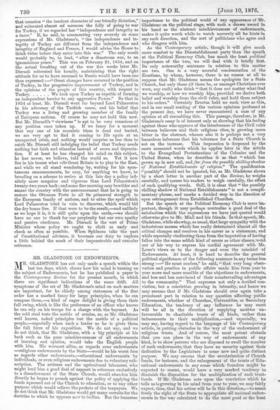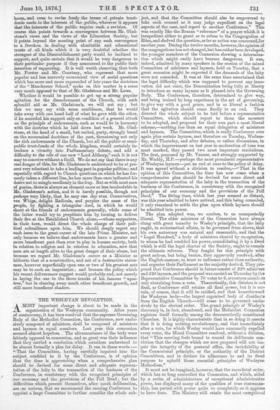MR. GLADSTONE ON ENDOWMENTS.
MR. GLADSTONE has not only made a speech within the last ten days, which shows how his mind is turning on the subject of Endowments, but he has published a paper in the Contemporary Review for the present month, in which there are significant indications of the same drift. All symptoms of the set of Mr. Gladstone's mind on such matters are important, for he chiefly among statesmen of the first order has a marked fancy for large principles, when he can compass them,—a kind of eager delight in giving them their full swing, which is like the preference of an officer who knows he can rely on his troops for a charge with the bayonet. As the cold steel tests the mettle of armies, so, as Mr. Gladstone well knows, naked principles test the mettle of a political people,—especially when such a leader as he is gives them the full force of his exposition. We do not say, and we do not think, that Mr. Gladstone, with a big principle at his back such as the pure mischievousness of all endowments of learning and opinion, would take the English people with him. His warmest allies, as regards some endowments —religious endowments by the State—would be his worst foes as regards other endowments,—educational endowments by individuals, or even religious endowments due to voluntary sub- scription. The artisans and the agricultural labourers, who might lend him a good deal of support in reference exclusively to a disendowment of the State Church, would abandon him directly he began to preach against the policy of applying the funds squeezed out of the Church to education, or to any other purpose which would relieve the pockets of the taxpayers. We do not think that Mr. Gladstone would get many recruits for the doctrine to which he appears now to incline. But the immense importance to the political world of any appearance of Mr.. Gladstone on the political stage, with such a drawn sword in his hand as the abstract mischievousness of endowments, makes it quite worth while to watch narrowly all he hints in any such direction, and the sort of politicians who agree and who disagree with him. As the Contemporary article, though it will give much more comfort to the Disestablishment party than the speech at the Political Econcany Club, has much the least political importance of the two, we will deal with it briefly first. Its only noteworthy sentences in relation to this matter are two. One is a very scornful condemnation of the Erastians, by whom, however, there is no reason at all to suppose that Mr. Gladstone means the apologists for a State Church, but only those (if there be, or amongst Christians ever were, any such) who think "that it does not matter what God we worship, or how we worship him provided we derive both belief and worship from the civil ruler, and hold them subject to his orders." Certainly Erastus held no such view as this, and in our small reading of the various opinions professed at the present day, we have never encountered a case of any opinion at all resembling this. This passage, therefore, in Mr. Gladstone's essay is of interest only as showing that his feeling against those who approve of the interference of the Civil ruler between believers and their religious rites, is growing more bitter in the abstract, whence also it is perhaps not a very hazardous inference that his tolerance for a State Church is not on the increase. This impression is deepened by the- more measured words which he applies later in the article- to the Evangelical Protestantism of the Colonies and the United States, when he describes it as that "which has grown up in new soil, and far from the possibly chilling shadow of National Establishments of religion." The qualification "possibly" should not be ignored, for, as Mr. Gladstone shows by a short letter in another part of the Review, he weighs carefully, and means his readers to weigh carefully, the effect- of such qualifying words. Still, it is clear that "the possibly chilling shadow of National Establishments" is not a compli- mentary phrase, and marks a decided step in the direction of open estrangement from Established Churches. But the speech at the Political Economy Club is more im- portant, though it may perhaps neutralise a good deal of the satisfaction which the expressions we have just quoted would otherwise give to Mr. Miall and his friends. In that speech, Mr. Gladstone, while showing, as usual, that large sympathy with the industrious masses which has really determined almost all the critical changes and resolves in his career as a statesman, and while especially vindicating them from the imputation of having fallen into the same selfish kind of errors as other classes, went out of his way to express his cordial agreement with Mr. Lowe's views as to the danger and even the mischief of Endowments. At least, it is hard to describe the general political significance of the following sentence in any terms less strong :—" He must confess," he said, "that very long obser- vation and practice in public affairs made him from year to year more and more sensible of the objections to endowments, and less and less convinced of their countervailing advantages. to the community." That expresses not only a decided con- viction, but a conviction growing in intensity, and hence we may assume that if Mr. Gladstone should ever again take a prominent part in relation to any question affecting public endowments, whether of Churches, Universities, or Secondary Education, the tendency of any influence he may exert will be all in the direction of supplying motives un- favourable to charitable trusts of all kinds, rather than inducements to their multiplication,—and especially, we may say, having regard to the language of his Contemporary article, in putting obstacles in the way of the endowment of religious trusts. And of course, the most potent obstacle that you can place in the way of endowments of any kind, is to show persons who are disposed to swell the number of such endowments, that they have no security against their dedication by the Legislature to some new and quite distinct purpose. We may assume that the secularisation of Church funds, for instance, and the enlargement of the trusts of Edu- cational endowments in any sense which founders might be expected to resent, would have a very marked tendency to diminish the disposition for the multiplication of such trust- funds. If Mr. Gladstone acts upon the conviction which he - tells 11f3 is growing in his mind from year to year, we may fairly expect, then, that his action will be in this direction,—to assert freely the right of the State to appropriate all national endow- ments in the way calculated to do the most good or the least
harm, and even to revise freely the terms of private trust- deeds made in the interests of the public, wherever it appears that the interests of the public require such a revision. Of course this points towards a convergence between Mr. Glad- stone's views and the views of the Liberation Society, but it points beyond the meeting point of any such convergence to a freedom in dealing with charitable and educational trusts of all kinds which it is very doubtful whether the strongest of the Disestablishment party would be inclined to support, and quite certain that it would be very dangerous to their particular purpose if they announced to the public their intention of supporting. It is well worth observing that both Mr. Forster and Mr. Courtney, who represent that more popular and less narrowly economical view of social questions which has more and more superseded of late years the doctrines of the "Manchester School," spoke on this matter in a sense very much opposed to that of Mr. Gladstone and Mr. Lowe.
Whether it would be possible to get up a strong popular agitation for the disendowment of the Church, with such splendid aid as Mr. Gladstone's, we will not say ; but this we may say with some confidence, that he would take away with one hand half of what he gave with the other, if he accorded his support only on condition of a general attack on the principle of endowments, such as would be in harmony with the doctrine which he laid down last week. Mr. Glad- stone, at the head of a small, but united, party, strongly based on the economical doctrines of the past, threatening not only the rich endowments of the Church, but all the public or semi- public trust-funds of the whole kingdom, would certainly in- troduce a vivacity into Parliamentary debate, and add a difficulty to the role of our new "Lord Althorp," such it is not easy to conceive without a thrill. We do not say that there is any real danger of this, for Mr. Gladstone is understood to be at pre- sent very reluctant to take a leading part in popular politics; and especially with regard to Church questions on which he has for- merly taken a different line, he has more than once indicated his desire not to mingle needlessly in the fray. But as with most men of genius, there is always an element more or less incalculable in Mr. Gladstone's action, and it is barely possible, though not perhaps very likely, that he may one day stun Conservatives, vex Whigs, delight Radicals, and perplex the mass of the people, by fighting a triangular duel, in which he would shoot at the friends of endowments generally, while some of the latter would try to propitiate him by turning to deliver their fire at the Established Church alone,—whose supporters, in their turn, would direct the whole charge of their poli- tical mitrailleuse upon him. We should deeply regret any such issue to the great career of the late Prime Minister, not only because we believe that endowments have a greater and more beneficent part than ever to play in human society, both in relation to religion and in relation to education, now that men are at length alive to the great danger of their abuse, but because we regard Mr. Gladstone's career as a Minister as hitherto that of a constructive, and not of a destructive states- man, however superficially open one or two of his greatest acts may be to such an imputation ; and because the policy which his recent deliverances suggest would probably end, not merely in laying the axe to the three trunks of his famous " upas- tree," but in clearing away much other beneficent growth, and still more beneficent shadow.































 Previous page
Previous page